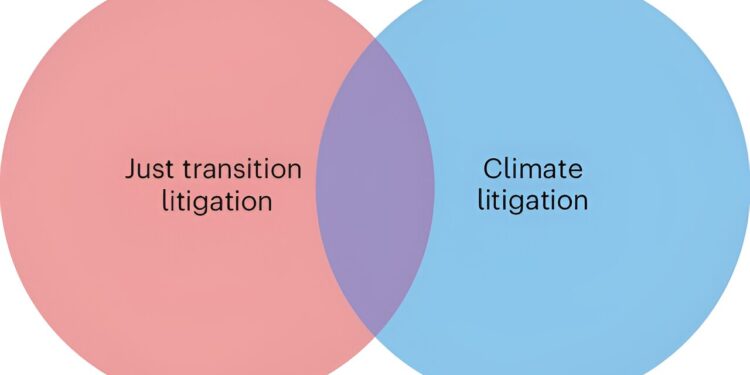Just transition litigation versus climate change litigation. Credit: Sustainability of nature (2024). DOI: 10.1038/s41893-024-01439-y
As the global trend toward low-carbon societies accelerates, a new study finds that justice concerns are increasingly surfacing in legal disputes over climate policies and projects. This phenomenon, described as “just transition litigation,” highlights the need to balance climate action with social justice considerations, ensuring that vulnerable communities are not disproportionately affected.
As the world works to reduce greenhouse gas emissions and adapt to the impacts of climate change, the transition to low-carbon societies raises new questions of justice. Published in Sustainability of naturea study led by Professor Annalisa Savaresi from the Center for Climate Change, Energy and Environmental Law at the University of Eastern Finland, highlights the emerging phenomenon of just transition litigation, described as legal disputes challenging the fairness and justice of climate policies and projects. , such as wind farms, biomass power plants and dams.
Co-authored by experts from 16 institutions, the article argues that while the transition to a low-carbon economy is essential, it has a disproportionate impact on vulnerable groups, including indigenous peoples, workers and local residents .
For example, the indigenous Sámi people of Norway successfully challenged the construction of wind farms on their traditional pastures, illustrating the potential of just transition litigation to protect the rights of marginalized communities. According to Professor Savaresi, such trials illustrate the often overlooked and highly complex social dilemmas and political conflicts that arise during transition.
Giving meaning to just transition disputes
The phenomenon of just transition litigation is little understood and under-explored. While in recent years much attention has been paid to strategic litigation aimed at advancing decarbonization (such as lawsuits against companies or governments that fail to reduce their emissions), this study shifts the focus towards trials that question the fairness of climate policies and projects.
At the heart of these legal disputes are issues such as the equitable distribution of benefits and burdens of climate policies, the inclusiveness of decision-making processes, and respect for the rights, identities and cultures of marginalized communities. This type of dispute is based on various legal bases, including administrative, constitutional, energy, environmental, human rights, labor and land planning law.
A call for more research
The paper introduces a new framework for understanding the justice demands of those affected by climate action. This framework can serve as a tool for systematic research on just transition litigation. There is currently a significant knowledge gap due to the lack of comprehensive and systematic data collection on these legal disputes.
The authors call for the creation of a dedicated dataset to track these cases and analyze their impacts on law, governance and society. Understanding these dynamics is crucial, as this type of litigation can potentially slow climate change mitigation efforts. This is all the more urgent as the governments of the EU, UK and US announce plans to “cut red tape” and speed up the transition.
More information:
Annalisa Savaresi et al, Conceptualizing just transition disputes, Sustainability of nature (2024). DOI: 10.1038/s41893-024-01439-y
Provided by the University of Eastern Finland
Quote: New research shows legal challenges to climate action are increasing (October 8, 2024) retrieved October 8, 2024 from
This document is subject to copyright. Except for fair use for private study or research purposes, no part may be reproduced without written permission. The content is provided for informational purposes only.



